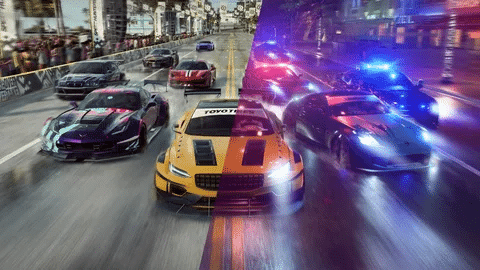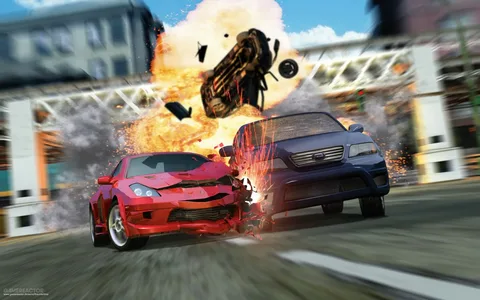
Car racing games have been a big deal for kids forever—think back to those clunky old arcade machines with Pole Position or Out Run, where the graphics were more squares than speed. Fast forward to today, and you’ve got the jaw-dropping tracks of Forza Horizon or the wild, kart-flipping fun of Mario Kart.
There’s something about that engine growl rattling your speakers, the way tires scream on a tight corner, or that heart-pumping moment you zoom past the finish line that just grabs kids and won’t let go. Kids could spend an entire day trying to beat one lap record—eyes glued to the screen, totally hooked. So, what’s behind this crazy love for virtual racing?
The Thrill of Speed
Kids are wired for excitement, just like the rest of us. Their days can feel like a boring loop—school bells ringing, homework piling up, and parents nagging about bedtime. Racing games?
They’re like a secret trapdoor out of all that. Do you remember watching children fire up Need for Speed after a long day of math worksheets? They’d grin like they’d just busted out of jail, flooring it through some neon-lit city while the real world faded away.
Being able to go wild, crash hard, and just hit reset teaches them something tough—like, it’s okay to mess up as long as you try again. It’s their own little playground, no skinned knees or grown-ups yelling about being careful. Every race feels like a tiny rollercoaster they built themselves, perfectly sized for whatever wild ideas they’ve got spinning in their heads.
Key Psychological Drivers
What keeps kids coming back for lap after lap? Several forces are at play, each tapping into their developmental wiring:
- Mastery: Learning to handle a virtual car—steering through curves, braking at the right moment—builds a growing sense of competence as they level up their skills.
- Competition: Outpacing AI opponents or trouncing friends in multiplayer mode feeds a primal urge to win, boosting self-esteem with every victory.
- Imagination: Customizing a dream car’s paint job or racing through fantastical worlds—like neon cities or gravity-defying tracks—unleashes boundless creativity.
- Instant Feedback: Every action—accelerating, crashing, or crossing the line—delivers immediate consequences, keeping engagement high with constant rewards.
These drivers don’t just entertain; they resonate with what kids need as they grow. Mastery satisfies their hunger to feel capable, competition hones their social edge, and imagination lets them dream beyond reality—all wrapped in a package that moves at 200 virtual miles an hour.
Skills Behind The Wheel
Beyond the fun, racing games sharpen real-world abilities. Hand-eye coordination gets a workout as kids swerve through traffic or drift around corners. Reaction times improve with every split-second dodge of a rival or obstacle. Strategic thinking emerges too—do they burn their speed boost early to take the lead or hold it for a dramatic finish? These cognitive gains sneak in under the radar, masked by the joy of play, but they’re shaping young brains with every lap.
This blend of entertainment and growth isn’t unique to kids. Adults might chase a parallel rush through platforms like Cash App casinos with instant withdrawals, where quick choices and instant payouts mimic the same thrill of control and reward. The stakes differ—kids race for glory, adults for cash—but the psychology aligns: both crave experiences that deliver fast feedback and a sense of agency.
Racing Games VS. Real Skills
Here’s how virtual racing translates to tangible skills:
|
Aspect |
Racing Game Benefit |
Real-World Skill |
|---|---|---|
|
Reaction Time |
Dodging obstacles at high speed |
Quick responses in sports or driving |
|
Focus |
Staying on track amid distractions |
Concentration in school or tasks |
|
Decision-Making |
Choosing when to boost or brake |
Problem-solving under pressure |
|
Persistence |
Retrying after a crash |
Resilience in facing setbacks |
This table reveals racing games as stealth educators. A kid who learns to recover from a spin-out in Need for Speed might later stay cool during a tricky exam. Studies back this up—action games like Racers can boost spatial awareness and decision-making, skills that linger long after the screen goes dark.
The Power Of Control
A huge draw is autonomy. Kids live in a world where adults dictate the rules—what to eat, when to sleep, and where to go. But in a racing game, they’re the driver. They choose the car, tweak its look, pick the track, and set the pace. They decide to play it safe or floor it through a risky shortcut. This control, paired with the physicality of speed—the controller’s rumble, the screen’s blur—feels like power. It’s the closest they get to driving without a license, and it’s intoxicating.
This agency is why racing games endure. Every race is a chance to craft their own narrative, win or lose. Hours spent perfecting a car’s design or replaying a track to beat a friend aren’t just about the game—they’re about staking a claim to independence in a world that rarely offers it.
A Lasting Impact
The magic of racing games isn’t just in the moment—it’s in what they leave behind. They create a cycle of play, improvement, and triumph that mirrors life’s learning curve. As kids grow, this passion can take new forms. Some chase real-world car sports—dreaming of rallycross or Formula 1, where the same thrill awaits on asphalt. Others carry the lessons elsewhere: focus for school projects, persistence for tough challenges. The psychology of speed imprints itself, showing how a game can spark confidence and curiosity.
Data supports this too. Research suggests kids who play fast-paced games often show sharper attention and quicker reflexes—skills that pay off in sports, academics, or even future driving lessons. It’s not just fun; it’s fuel for growth, delivered at turbo speed.
More Than A Game

So, next time you see a kid hunched over a console, eyes locked on a speeding car, look closer. They’re not just chasing pixels—they’re chasing mastery, thrills, and a slice of control in a world that rarely hands them the keys. Racing games are a high-speed classroom, a dopamine-charged rite of passage. One lap at a time, they’re discovering who they are—and who they might become. That’s a journey worth rooting for.

